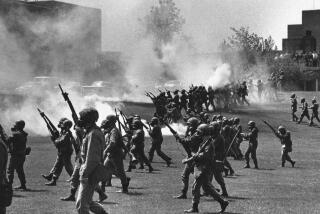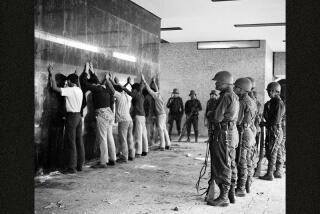James Rhodes; Governor Sent Troops to Kent State
- Share via
COLUMBUS, Ohio — Former Gov. James A. Rhodes, whose decision to quell an antiwar protest by sending National Guard troops to Kent State University in 1970 resulted in four deaths, died Sunday. He was 91.
Rhodes, the state’s only four-term governor, died at Ohio State University Medical Center of complications from an infection and heart failure, said David Crawford, a hospital spokesman.
The son of a coal miner, Rhodes rose from poverty to become Columbus mayor when he was 33. The election marked the beginning of a career in politics that spanned nearly 50 years.
Rhodes was credited with bringing many industries to Ohio. During his administrations, the state built highways, expanded the university system and put an airport in almost every county.
A college dropout, he also was credited with making Ohio a leader in vocational education.
But the Kent State shootings cast an indelible shadow on his career.
On May 2, 1970, Rhodes decided to send the National Guard to Kent State, which, like campuses across the nation, was in turmoil over the incursion into Cambodia during the Vietnam War. Protesters had vandalized businesses in downtown Kent, and the campus Army ROTC building was burned.
Two days later, guardsmen used tear gas to disperse taunting, rock-throwing students. Then at about noon, the guardsmen fired at least 61 shots in a 13-second burst.
Four students were killed and nine wounded. The reason behind the shooting was never fully learned.
Lawsuits against Rhodes and other officials ended in January 1979, when the victims’ families agreed to settlements totaling $675,000. In the agreement, several guardsmen also expressed their regrets for the shooting.
Two years ago, the spots where the four students fell in a dormitory parking lot were marked off as permanent memorials, with granite borders and waist-high lampposts and the date and name of each slain student.
Those close to Rhodes said he was saddened by the tragedy but blamed the turbulence of the war era and believed his action was necessary. Earlier in 1970, there already had been three riots on Ohio campuses.
“The Kent State call came from the merchants and county commissioners because of the conditions that were existing the night before,” Rhodes said years later. “You see, it was a consensus.”
In 1986, Rhodes made a bid for an unprecedented fifth term as Ohio governor. He won a three-way Republican primary but lost to incumbent Democratic Gov. Richard Celeste, a man he had defeated for the state’s top post in 1978.
Rhodes was a widower and is survived by two daughters.
More to Read
Sign up for Essential California
The most important California stories and recommendations in your inbox every morning.
You may occasionally receive promotional content from the Los Angeles Times.












